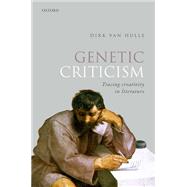In Genetic Criticism, Dirk Van Hulle introduces the study of creative processes to an Anglophone audience. As a method in the study of literary writing processes, genetic criticism is also a reading strategy. The idea behind this book is to introduce this strategy to a broader audience, from interested readers and graduate students to early career researchers and literary critics. In literary studies, it is often obvious that a particular work somehow seems to hit a nerve, but more challenging to pinpoint exactly why it 'works'. This book therefore starts from a clear, basic assumption: knowing how something was made can help us understand how and why it works.
This strategy is at the basis of many disciplines, including art history. By means of X-ray technology or hyperspectral imaging, it is possible to look at a painting as a multilayered object with not only spatial dimensions, but also a temporal one. This temporal dimension is the core of the reading strategy introduced in this book. Note books, marginalia, manuscripts, and typescripts (even if one works with scans) give a concrete dimension to literature, which is a helpful reading strategy for many students. On the one hand, this involves concrete, transferrable skills such as aspects of transcription and digital scholarly editing. On the other hand, it also involves more abstract theoretical issues relating to matters of authorship, collaboration, authority, agency, intention and intertextuality.








